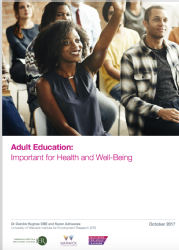IER News & blogs
Adult education: important for health and well-being

This latest research, commissioned by the Institutes for Adult Learning, aims to increase awareness of the benefits that adult education can bring to the nation's health and well-being. It also aims to stimulate dialogue on how central and devolved government policies and practices can ensure that adult education remains a strategic priority.
So much evidence points to the fact that adult education makes a significant contribution to the health and well-being of individuals and communities. It can be relied upon to assist in addressing national policy challenges such as encouraging and enabling individuals and families to take a more active role in their own health and well-being. However, this added-value contribution is at serious risk of being lost in a policy landscape pre-occupied with apprenticeships, skills and qualification reforms. Devolution presents some real opportunities in local economies to address the skills shortages expected to follow Brexit.
Our evidence points to three key messages:
- Adult education does help keep individuals well and supports longer and productive lives.
- Adult education does help meet major challenges such as: ageing, loneliness, long-term conditions, mental health and well-being and community cohesion.
- Adult education does help save money in the National Health Service (NHS) and the social care system.
Six recommendations are outlined in the report. These are aimed at local, regional and national policymakers, educationalists, NHS 'Sustainability and Transformation Partnerships' (STPs), Health and Well-Being Boards, Clinical Commissioning Group (CCGs), Local/Combined Authorities and Local Enterprise partnerships (LEPs) and others working in the Health and Social Care Sector. This report builds upon earlier research 'Adult Education: Too Important To Be Left To Chance' (2016).
